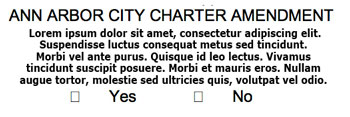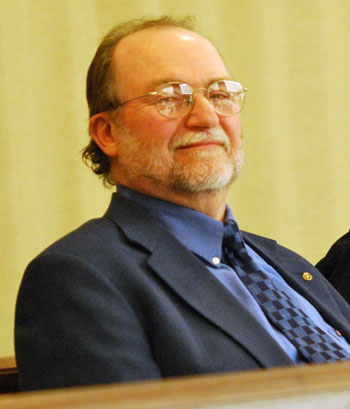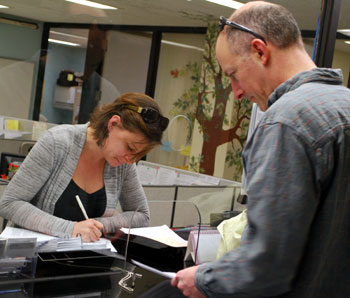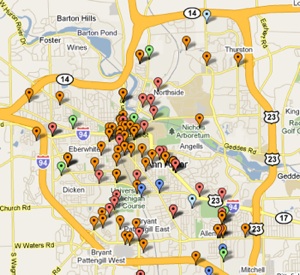Ann Arbor city council meeting (Aug. 9, 2012) Part 1: Three questions were considered by the council for possible inclusion on the Nov. 6 general election ballot – two about parks and one about public art. The two parks questions were included on the council’s online agenda, which was available on Aug. 1. Details of their content had been publicly aired well in advance of that. The same was not true for the public art millage proposal.

At its Aug. 9 meeting, the Ann Arbor city council considered three different charter amendments for inclusion on the Nov. 6 ballot. Two were for millages, and a third was for a restriction on the contractual powers of the city with respect to parkland.
The council voted unanimously to place on the ballot a renewal of the city’s parks maintenance and capital improvements millage at the rate of 1.1 mills. One mill is $1 for every $1,000 of taxable value on a property. So for a house worth $200,000, with a state-equalized value of $100,000, a 1.1 mill tax would cost that property owner $110 per year. A renewal would run from 2013-2018 and raise about $5 million next year.
Examples of park maintenance activities include forestry and horticulture, natural area preservation, park operations, recreation facilities, and targets of opportunity. Capital improvement projects would cover parks, forestry and horticulture, historic preservation, neighborhood parks and urban plazas, park operations, pathways, trails, boardwalks, greenways and watersheds, and recreation facilities. The city’s park advisory commission (PAC) had voted unanimously nearly two months ago at its June 19, 2012 meeting to recommend placing that millage renewal before voters.
But one day before the council’s Aug. 9 meeting, PAC had voted unanimously against recommending that another park-related question be placed on the ballot – one that would have asked voters if they wanted to amend the city charter to require a referendum to lease parkland for non-park or non-recreational use for longer than five years. PAC was able to consider a recommendation only because the council had postponed the measure at its July 16, 2012 meeting.
And at its Aug. 9 meeting, the city council did not meet the 7-vote threshold on the 11-member body to place that charter amendment on the ballot. It got just four votes – from Marcia Higgins (Ward 4), Mike Anglin (Ward 5), Jane Lumm (Ward 2) and Stephen Kunselman (Ward 3). Sabra Briere (Ward 1), who had co-sponsored the original resolution, did not vote for it, after modifications to the wording had failed to win the council’s approval.
Not originally on the council’s Aug. 9 agenda, but added at the start of the meeting, was a resolution to place a ballot question before voters in November that would ask them if they want – at least temporarily – to change the way that funds are accumulated to pay for public art in the city. Currently, funds must be set aside as part of most capital improvement project budgets – 1% up to a limit of $250,000 per project.
The ballot proposal on public art would levy a 0.1 mill tax for a four-year period – which translates roughly to $450,000 per year. In its current version, the wording of the proposal would suspend the collection of Percent for Art funds under the city’s ordinance just for the four-year period of the millage. So if voters approved the public art millage this year, and then failed to approve a millage renewal four years from now – either because the council did not place a renewal on the ballot, or voters rejected the renewal – the Percent for Art ordinance would again require that funds from capital project budgets be set aside for public art.
The reaction from councilmembers to the proposal from Christopher Taylor (Ward 3) was generally positive; however, there was considerable dissatisfaction expressed – at the meeting and subsequently – with the secretive nature of the work that had produced it. Taylor’s apparent goal in placing it on the agenda at all was to reveal the content of the proposal, without asking his colleagues to vote on it. Taylor asked for postponement of the resolution after reading aloud a speech about it. The council agreed unanimously to postpone action until its next meeting, on Aug. 20.
Voting on Aug. 20 to place the question on the ballot would allow for some public discussion before taking action on that issue, while still meeting the statutory deadline for delivering ballot language to the Washtenaw County clerk.
The public art commission has called a special meeting for Aug. 15 in order to weigh in on the subject.
Part 1 of this council meeting report deals just with these ballot questions. Part 2 will handle other business items at the Aug. 9 meeting. [Full Story]








